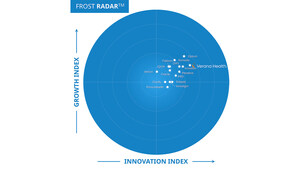
SAN FRANCISCO, Nov. 16, 2022 /PRNewswire/ -- Verana Health®—a digital health company elevating quality in real-world data (RWD)—today announced it is developing Qdata™ MS, a Neurology Qdata module that will be used to help advance clinical research and develop therapeutic strategies for treating patients with multiple sclerosis (MS). The company made the announcement ahead of the CNS Summit 2022 (Nov. 17 to 20) in Boca Raton, Fla.
Neurology Qdata comprises quality, curated datasets documenting real-world disease data, treatments, and outcomes. Available through Verana Health's real-world evidence (RWE) service offerings, Qdata MS is being derived from the American Academy of Neurology's Axon Registry®. The Axon Registry, managed by Verana Health's VeraQ™ population health data engine, is one of the largest—and growing—real-world clinical data registries for neurology. As the Qdata MS module evolves through development, it is estimated to include de-identified, curated RWD from about 30,000 patients diagnosed with MS, one of the largest longitudinal multiple sclerosis datasets for research use.
MS impacts a person's brain, spinal cord and optic nerves, which comprise the central nervous system (CNS). This unpredictable disease causes a person's immune system to attack the CNS, disrupting signals to and from the rest of the body. Nearly 1 million people are living with MS in the U.S., according to a 2019 study funded by the National Multiple Sclerosis Society. That is more than twice the number from a national study in 1975. MS is nearly three times more common among women than men.
Qdata MS provides quality insights into the patient population by applying artificial intelligence to the unstructured data found in clinical notes to help provide a more complete understanding of disease activity and clinical characteristics such as MS phenotype, Expanded Disability Status Score (EDSS) score, and clinical relapse. Using de-identified electronic health record (EHR) data, detailed diagnostic classification beyond international classification of diseases (ICDs), and a granular understanding of disease activity, researchers can gain a better understanding of the MS patient journey.
Curated, de-identified RWD from patients with MS can help offer insights into how patients are living with this disease and reacting to treatments.
"Qdata MS gives patients and their physicians the opportunity to contribute and lend their anonymized experiences to research and engages the broader neurology community to learn more about this disease," said Heather Moss, MD, PhD, associate professor at Stanford University and Verana Health medical advisor. "Qdata MS has the potential to provide a more granular view of the MS patient journey that is not easily found within structured EHR fields, medical claims, or pharmacy claims. The ability to bring meaning to unstructured, de-identified neurologist notes on tens of thousands of MS patients will provide a valuable new dataset to help researchers develop and study treatments for various MS patient cohorts."
The new curated RWD module will benefit life sciences research through:
- Clinical development. As MS treatments improve, Qdata MS can help optimize study design.
- HEOR and medical affairs. Qdata MS can help researchers understand and track the patient journey for treated and untreated MS patients, from diagnosis by phenotype through treatment and disease course.
- Commercialization. Qdata MS can help reveal treatment performance across Axon Registry practices, clinical characteristics, and more, as well as deliver market insights based on details extracted from unstructured clinical notes.
"Qdata MS will help support MS researchers in accessing insightful RWE and allow practices enrolled in the Axon Registry to potentially participate in or help influence groundbreaking clinical research," said Sujay Jadhav, CEO of Verana Health. "By making this de-identified data available, the American Academy of Neurology and Verana Health are enabling MS researchers to gain a better understanding of this disease and how it can be treated."
Verana Health is continually developing new Qdata modules to help deepen understanding about diseases, patient journeys, and to help physicians and life sciences organizations improve quality of care for patients. Verana Health's first neurology module, Qdata SMA, launched in April 2022. It provides a real-world, de-identified dataset reflective of spinal muscular atrophy (SMA) patients found across healthcare settings. The company has plans to add Qdata modules for other neurological diseases, such as Parkinson's Disease, Neuromyelitis Optica Spectrum Disorder (NMOSD), and more.
For more information on Qdata MS, visit: https://info.veranahealth.com/qdata-ms.
About Verana Health
Verana Health® is a digital health company elevating quality in real-world data. Verana Health operates an exclusive real-world data network of more than 20,000 healthcare providers (HCPs) and about 90 million de-identified patients, stemming from its strategic data partnerships with the American Academy of Ophthalmology®, American Academy of Neurology, and American Urological Association. Using its clinician-informed and artificial intelligence-enhanced VeraQ™ population health data engine, Verana Health transforms structured and unstructured healthcare data into curated, disease-specific data modules, Qdata™. Verana Health's Qdata helps power analytics solutions and software-as-a-service products for real-world evidence generation, clinical trials enablement, HCP quality reporting, and medical registry data management. Verana Health's quality data and insights help drive progress in medicine to enhance the quality of care and quality of life for patients. For more information, visit www.veranahealth.com.
Media contact:
Megan Moriarty
Amendola Communications
913.515.7530
[email protected]
SOURCE Verana Health







Share this article